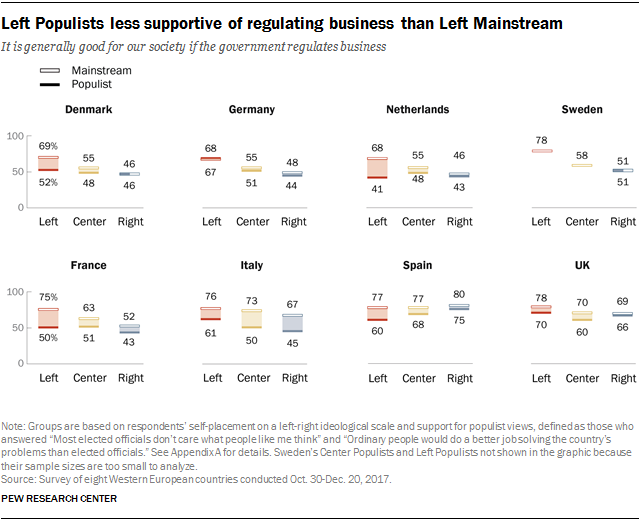Western European publics generally favor an active role for the government in the economy. More than half of the public in most countries surveyed say it is the government’s responsibility to ensure a decent standard of living for all, and similar shares also say that government regulation of business is generally good for society. However, these eight publics differ markedly in their assessments of how their economies are performing.
Opinions on economic policy largely break along traditional left-right ideological lines.5 Most of those on the left favor government intervention in the economy, while those on the right are more skeptical. Populists’ views tend to fall closest to their mainstream ideological counterparts. Left Populists are usually most similar to the Left Mainstream; Right Populists, to the Right Mainstream. But to the degree that people with populist sympathies differ from people in the mainstream, they are somewhat more likely to see the government as having a responsibility to guarantee everyone a basic standard of living and somewhat less likely to support regulating business. Populists across the ideological spectrum are also much more pessimistic about the state of the economy, in general, than those in the mainstream.
Amid divides across countries in ratings of economy, those with populist views are more negative
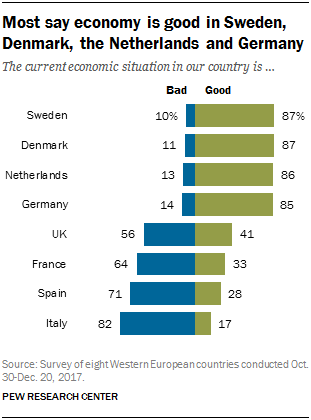
European publics diverge in their assessments of their country’s economies. More than eight-in-ten in Sweden (87%), Denmark (87%), the Netherlands (86%) and Germany (85%) say their current economic situation is good, compared with fewer than half who say the same elsewhere. Italians and Spaniards are especially negative: 71% in Spain and 82% in Italy say the economic situation is bad, with 34% of Spaniards and 31% of Italians saying it is very bad.
People with populist views are generally less positive about the economy than those in the mainstream. France illustrates this pattern well. There, similar minorities of Left, Center and Right Populists see the economy doing well (24%, 21% and 27%, respectively) – assessments which are significantly lower than those of the Left, Center and Right Mainstream (44%, 43% and 41%, respectively).
Germany follows a similar pattern: Roughly nine-in-ten of the Left (91%), Center (92%) and Right Mainstream (88%) say the current economic situation in Germany is good, while about three-quarters of Left (76%), Center (74%) and Right Populists (77%) feel the same.
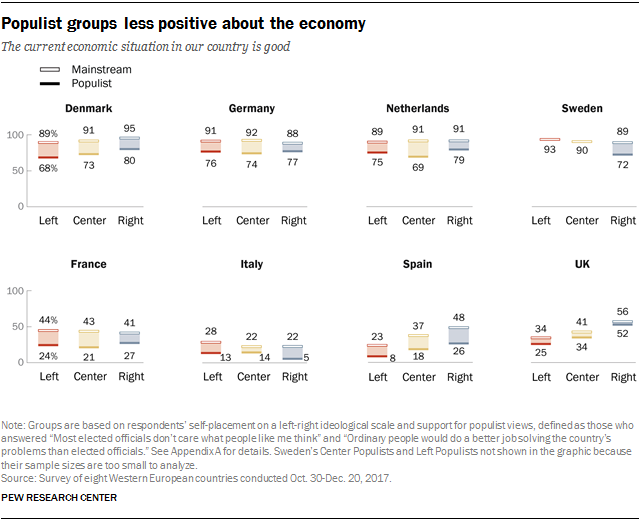
Left and right split over government’s responsibility to guarantee a decent standard of living
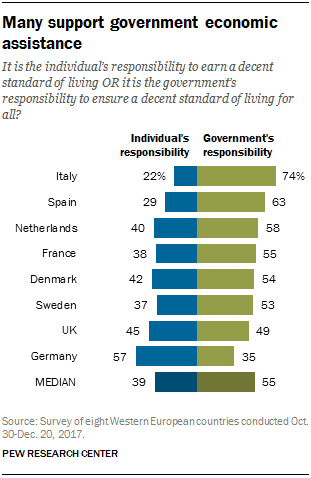
More than half of the public in six of the eight countries surveyed say it is the government’s responsibility to ensure a decent standard of living for all. Support for government assistance is highest in Italy and Spain, where more than six-in-ten say it is the government’s responsibility, including 55% in Italy and 43% in Spain who feel this way strongly. Germany is the only country where public opinion falls on the other side of this issue: Just 35% of Germans think the government should be responsible, while 57% say that individuals should earn a decent standard of living for themselves.
Left-right ideology is central to how people feel about this issue. In general, most on the left place responsibility on the government to guarantee that everyone has a decent standard of living, while many on the right do not. In seven of the eight countries – the notable exception being Germany – widespread majorities of roughly seven-in-ten or more of groups on the left place the responsibility on government. For example, in the Netherlands, 71% of the Left Mainstream take this position compared with half of the Right Mainstream.
In Denmark, Germany, the Netherlands and Sweden, people with populist views differ little from their mainstream counterparts on this issue. Take Denmark as an example: About seven-in-ten Danes on the left favor government responsibility – including 71% of the Left Mainstream and 69% of Left Populists. On the other end of the spectrum, about four-in-ten on the right say the same, with little difference between the Right Mainstream and Right Populists.
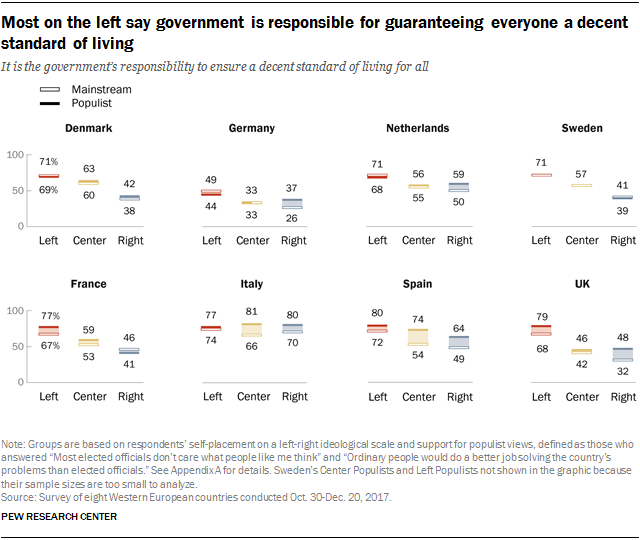
In France, Italy, Spain and the UK, there are more pronounced differences between populists and the rest of the public, with populists being somewhat more likely to express support for government assistance than those in the mainstream. For instance, about three-quarters of French Left Populists (77%) say it is government’s responsibility to ensure a decent standard of living for all, compared with two-thirds of the French Left Mainstream. And while those on the right are generally less favorable to government guarantees, Right Populists in Italy, Spain and the UK are more open to government solutions than the Right Mainstream.
On government regulation of business, left-right divides are somewhat more consistent than differences by populist views
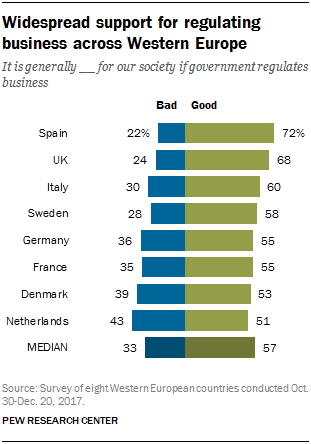
In each country surveyed, about half or more say it is generally good for society if government regulates business. This ranges from a high of 72% in Spain to a low of 51% in the Netherlands.
Views on regulation, like those on the social safety net, are grounded in ideology. Most on the left say it is good to regulate business, while the right tends to be less in favor. But populist views also play a role on this issue, especially on the left. Left Populists tend to be significantly more likely than the Left Mainstream to say regulation is bad, while Right Populists differ little from the Right Mainstream in their evaluations.
Denmark provides a clear example: While many on the left say regulation is a good thing, the Left Mainstream (69%) are significantly more likely to take that stance than Left Populists (52%). In contrast, Danish Right Populists and the Right Mainstream are equally likely to say regulation is good – 46% of each group. In Italy and France, Right Populists differ from the Right Mainstream and are much less supportive of regulation.
